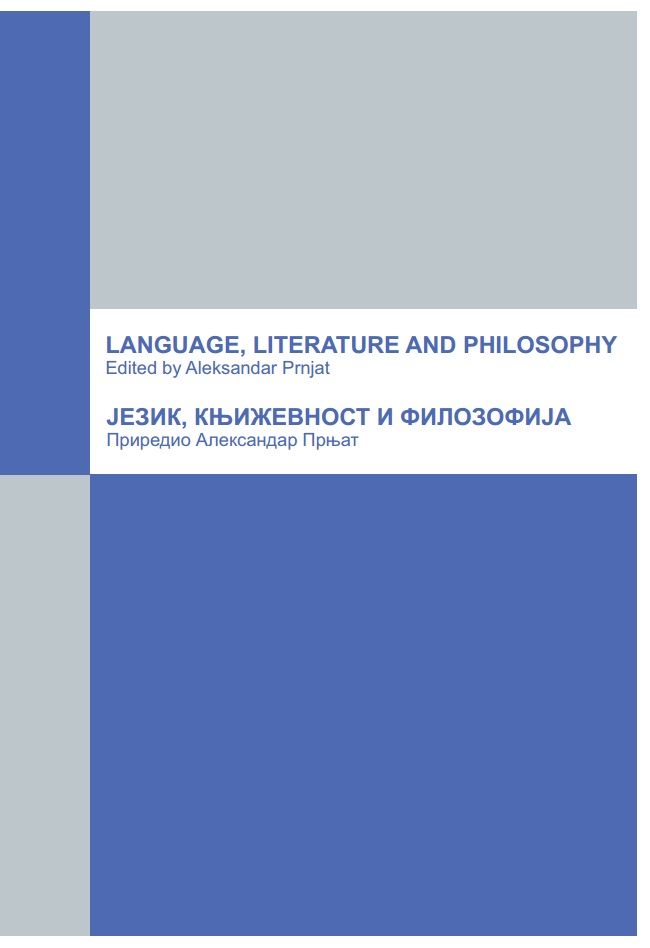
We kindly inform you that, as long as the subject affiliation of our 300.000+ articles is in progress, you might get unsufficient or no results on your third level or second level search. In this case, please broaden your search criteria.

Book review of: Panorama współczesnej filozofii, Jacek Hołówka, Bogdan Dziobkowski (ed.), Wydawnictwo Naukowe PWN, Warszawa 2016, pp. 559.
More...
Ludwig Wittgenstein’s and John L. Austin’s studies have offered a new concept of language. Should one, in the light of The Philosophical Investigations and How to Do Things With Words, limit himself or herself exclusively to investigating the manner in which feelings are spoken about, whilst remaining tacit as to the very nature of feelings? Can love be talked about using the language of analytic philosophy? The Author’s quest is one forgiving replies to those queries; to this particular end, declaration of love is made subject to detailed analysis from the standpoint of Wittgenstein’s concept of linguistic games and Austin’s speech act theory.
More...
The article offers arguments for the compatibility of specific types of internalism and externalism in epistemology through a comparative analysis of the approaches based on their aims of investigation. Such compatibility is viewed as possible after the oppositional differences that are related to the elements of justification, are overcome. In this regard, the question about the agents of knowledge is answered, with reference to the thesis about the irreducibility of the internalist condition of reflexive access. Considerations of conceptual clarity and succession are raised with regard to the externalist condition that removes the epistemic arbitrariness in the founding of beliefs.
More...
The NOEMA Journal continues to publish, in a series, the book THE SECRET OF GENIALITY (Yerevan, Armenia, Noyan Tapan Printing House, 2002) by our colleague Robert Djidjian, not only because we all must know the philosophical research and creation (in our domain of epistemology and philosophy of science and technology) from a wider geographic area than that provided by the established fashion in virtue of both extra-scientific reasons and a yet obsolete manner to communicate and value the research; but also because the book as such is living, challenging and very instructive. The title of the book is suggestive enough to make us to focus on an old age question: the dialectic of the insight, of the discovery, its psychology moving between flashes of intuitions and cognizance stored in memory, and its logic of composition of knowledge from hypotheses to their demonstration and verification. The realm of science is most conducive to the understanding of this dialectic and the constitution of the ideas which are the proofs of what is the most certain for humans: the “world 3”, as Popper called the kingdom of human results of their intellection, and though transient and perishable in both their uniqueness and cosmic fate, the only certain proof of the reason to be of homo sapiens in the frame of multiversal existence. Therefore, creation is the secret of the human geniality, and how to create science is a main part of this secret.
More...
Stereotypes and prejudices influence our daily lives, and in certain circumstances we operate withthem, despite the fact that we think we are free of prejudices. Not infrequently, they can becomebarriers in the communication, knowledge and acceptance of those around us; from this point ofview, we must have the readiness to deal with our own prejudices, so that we do not reachsituations of discrimination, marginalization, rejection or exclusion of some people on subjectivegrounds, influenced by stereotypes and misrepresentations about others (we often observe that ourattitude and behavior towards a stranger is influenced by the way that person looks or is dressed).This study is based on stereotypes. It aims to identify attitudes and behaviors that perpetuate orchallenge gender stereotypes in education. We will see what is stereotype, prejudice,discrimination, we will go a little bit on gender, cultural and language stereotypes, and finally wewill see concrete examples within a school unit. This theme has become a problem of society.Stereotypes give rise to prejudices, and further discrimination. And during this research I noticedthat since we were born, these things have been instilled in us.
More...
The article shows that Ludwig Wittgenstein used mostly pragmatic analysis to study the problem of knowledge in the later period. Without giving clear definitions of epistemological concepts, he argued that our interpretations of knowledge depend on the context of language-games, ideas of truth, certainty and justification, as well as the level of education and culture that form our way of life. It was found that the ideas of pragmatics were useful to Wittgenstein in order to more clearly define the nature of true knowledge, to outline the specifics of our refleсtions about certainty, as well as to analyze in detail all aspects of the justification. It is stated that his epistemological researches and discussions around them raised a wide range of not only linguistic but also psychological, cognitive and metaphysical issues, which made our understanding of the nature of knowledge much more comprehensive.
More...
Ojcze nasz to najważniejsza modlitwa chrześcijan. Jako starożytny tekst biblijny od wieków poddawana jest badaniom oraz tłumaczona na nowo wraz z rozwojem języków docelowych. Ze względu na powszechność tej modlitwy takie zmiany nie zachodzą niepostrzeżenie i budzą sprzeciw członków różnych wspólnot wyznaniowych. Niniejszy artykuł przedstawia specyfikę przekładu tekstów liturgicznych na podstawie analizy tłumaczeń na język szwedzki. Pokazana zostaje historia szwedzkiego tłumaczenia modlitwy Ojcze nasz, aż do opublikowania kontrowersyjnej wersji ekumenicznej w 1996 r. Przeanalizowane zostają wybrane różnice w „starym” i „nowym” tłumaczeniu oraz najważniejsze postulaty w debacie nad przyjęciem wersji ekumenicznej. Artykuł zamyka przytoczenie obecnego stanowiska kościoła katolickiego i protestanckiego wobec nowej wersji oraz dyskusja nad nowoczesnością i tradycją we współczesnych tłumaczeniach Modlitwy Pańskiej. Studium pozwala zobaczyć, w jaki sposób zmiany w obszarze przekładu mogą spowodować poruszenie społeczne i konflikt, jeśli nie są dostosowane do aktualnych przekonań reprezentantów danej kultury. // "Our Father" is the most essential Christian prayer. Being an ancient biblical text it has been translated and interpreted through the ages as target languages were developing. Due to the universality of this prayer, such changes do not occur unnoticed and raise opposition of members of various religious communities. This article presents the specifics of the translation of liturgical texts based on the analysis of translations into Swedish. The history of the Swedish translation of the "Our Father" prayer is covered up to the publication of the controversial ecumenic version in 1996. Selected differences in the "old" and "new" translations and the most important postulates in the debate on the adoption of the ecumenical version are analyzed. The article ends with a description of the current position of the Catholic and Protestant Church regarding the new version and a discussion on modernity and tradition in translations of the Lord's Prayer. The study shows how changes in the area of translation can cause social uproar and conflict, if they are not adapted to the current convictions of representatives of a given culture.
More...
The article examines Ludwig Wittgenstein’s views on the world and human beings in it. It is emphasized that the philosopher, in addition to paying a lot of attention to the study of language, which determined the basis of his method of cognition, followed a number of worldview ideas about reality. They were supported by the achievements of physics of that time, although Wittgenstein himself argued that the study of reality is not possible without understanding the metaphysical issues concerning the unspeakable, supernatural, spiritual, and so on. It shows how Wittgenstein interpreted the world and reality, distinguished between different levels of being, studied logical atoms, not laws, analyzed facts, not things, comprehended not only the macrocosm but also the microcosm, and as a result built a pragmatic ontological-cosmological conception, in which human and the way of their being in the world occupied a significant place.
More...
When philosophy of mind goes into every detail in explaining about consciousness and its every aspect, the problem of other minds being its part is not spared. In such context going against the traditional way of giving justification Wittgenstein novel approach to other minds is remarkable and is close to the phenomenological understanding. The analysis of the sensation of pain as one of its important factors in solving the other minds problem is unique and it is this that proves how Wittgenstein dissolves the problem rather than giving a solution. This article focuses Wittgenstein’s two important factors: Private Language Argument and the concept of the sensation of pain in dissolving the issue. And in this I have made an attempt to show how his novelty in approaching this problem gains importance even today.
More...
The text analyzes the possibilities to think of pure language as indicated in the harmonization of modes of intention in the translation activity. This language is, in a sense, a regulative idea and it have to be liberated in translation. It is essential to distinguish between the modes of intention and intended objects, between what is named in pure language and what is „overnamed“ in human languages. One of the theses in this text – that language in its auto-relation undergoes auto-modalization – makes the connection with Kierkegaard's understanding of the impossibility of direct communication. The indication of the untranslatable is an opportunity in the language of the translator to insert as indicated the elusive in the translation and thus to introduce the use of a broken language. Awakening of the "echo of the original" means a „thinking more“ (according to Kant) through the figure.
More...
In this paper I present a new dimension for philosophical and scientific analysis of artifacts as anthropogenic abiotic objects along the lines of the distinction between real and virtual. This distinction purports to replace the classical opposition material–ideal as a better way of defining what an artifact is and as one more compatible with the scientific description and explanation of artefacts. The virtual relativity of the virtual artifacts is their relatedness to local language forms as an adequate coordinate system. The real relativity of artifacts is their relatedness to local and global human life processes. The article follows empirical science as a technique of studying artifacts, and subscribes to the anthropological paradigm.
More...
Analytic description, according to members of the Lvov-Warsaw School (LWS) like Czeżowski, Ajdukiewicz, Ossowska, Tarski is a powerful and an indispensable tool, not only in philosophy but also in any natural science – in psychology especially. It should be equally respected together with empirical analysis and even it is recommended that it should precede any further research. Therefore, the book Analiza i konstrukcja: o metodach badania pojęć w Szkole Lwowsko-Warszawskiej [Analysis and construction: on the methods of researching concepts in the Lvov-Warsaw School] can be recommended to philosophers as well as scientists.
More...
The article shows that in matters of philosophy of religion, when the sphere of interest of Wittgenstein went beyond logical and linguistic analysis, he attached special importance to a pragmatic approach to the interpretation of religious experience. Wittgenstein’s philosophico-religious studies were largely inspired by the events of his own life , as well as the ideas of individual thinkers, including the pragmatic philosopher William James. In Wittgenstein’s work one can find both a substantiation of the originality of religion and its impossibility of analysis from the standpoint of science, and a conviction in the expediency of religious experience in human life. It is revealed how Wittgenstein, analyzing the main manifestations of religious experience, pragmatically eliminated contradictions in the comprehension of knowledge about God (as unspeakable), pointed out the importance of transition from skepticism to belief as a basis for experience of absolute safety, took into account socio-practical aspects of various ethico-religious experiences such as feeling guilty. The author finds out how Wittgenstein interpreted the practical value of religious experience, analyzed the language of religion, as well as revealed its socio-psychological and ethical aspects.
More...
In her novels, Ananda Devi has always known how to immerse us in texts ennobled by local paintings where matrix India appears through the representation of a Cosmogonic universe dominated by magico-spiritual symbolism. Certain homogeneous interpretations, the fruit of historical constructions, obscure, even sometimes neglect, the deeply rooted heterogeneity of Indian traditions in Mauritius. This “bipolar contrast” (Sen, 2007), the sum of imaginary splices and cultural inter-fusion, nevertheless constitutes the humus of the Mauritian identity built over the course of colonial history. The author then illustrated herself through her writings as a major figure in this form of binary representation of the Mauritian universe. Our study aims at revealing the imaginary amalgams that circulate in Devis texts, starting from forms of discourse and knowledge surreptitiously disseminated in motifs such as the “sari” and “the hair”. By relying on an ethnocritical analysis grid, we will show how the Devi’s ethnotexts (Motsch, 2000), manage by a meiotic effect, to shape a “new humanism” at the antipodes of “orientalist representations” (Said, 1978) and ethnocentric of India as seen by the West.
More...
The book "Introduction to Logic: Classical Propositional Logic" is the first part of an introduction to logic which is intended primarily for students in humanities and related subjects. The book presents not only the main information about propositional logic, whereas an accent is put on the notion of entailment. The reader is gradually introduced to techniques enabling investigation of semantic properties of formulas and methods of formal demonstration as well as their applications in the field of natural language. The book involves a number of practical examples; a great portion of them practise constructing negations and equivalents and checking arguments.
More...
After a theoretical review of the studies of dreams in anthropologically oriented research, the author especially considers folkloristic studies of the dreams symbolism, as well as the dream stories as a genre. The second part of the paper is dedicated to the analysis of field narratives – the stories of prophetic dreams. The focus is on the problems of the interpretation logic, the way of fitting into the autobiographical experience, and the relationship between the individual conceptions of dreams symbolism and the traditional matrices.
More...
This article attempts to show if the entire story of the Vālmīki Rāmāyaṇa is perhaps a narrative which is a subtle depiction of the interplay of the three guṇas of sattva, rajas and tamas which are cardinal principles in the ontology, cosmology, psychology and soteriology of the Sāṅkhya-Yoga system of classical Hindu philosophy.
More...
Didactics is a function of an educational system based on examination-observation of the people who participate in the process of teaching and learning. In the process of conveying knowledge this observation of a student by a teacher/master, and vice versa, every now and then builds a practice of independent thinking. On the one hand, the process enables the development of ideas, but, on the other hand, also distorts them and exposes a humanities student to the pitfall of ideology. In my reflections about the disassembly of ideas and deteriorating education I shall make use of the concept of cognitive bias, the polemic about the contemporary University (Bill Readings), the concept of Jacques Lacan’s discourses, Hannah Arendt’s findings about willing and ideology, and Niklas Luhmann’s assumptions of social systems theory understood as autopoietic systems of codified rules of operation.
More...
The present text includes a brief review of the publications and research on the theme of the motherland in Bulgaria and abroad. In the context of the contemporary migration movements some possible aspects and ways of studying motherland concept are also presented. By analyzing the attitudes of the Bulgarian expatriates coming back, the author presents the relation and the images associated with the motherland – i.e. the native home, the coziness of the home, the well-known nature, as well as some fragrances and feelings.
More...